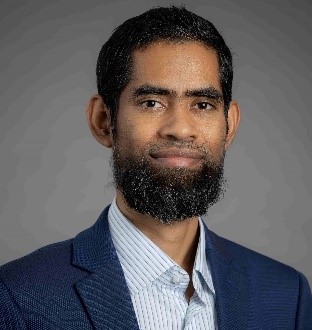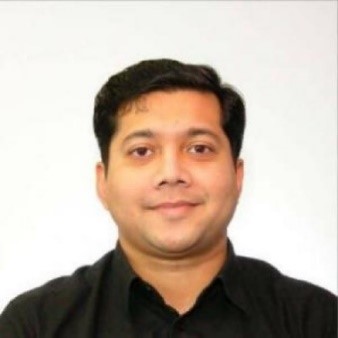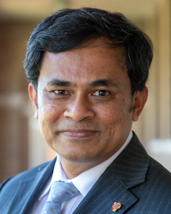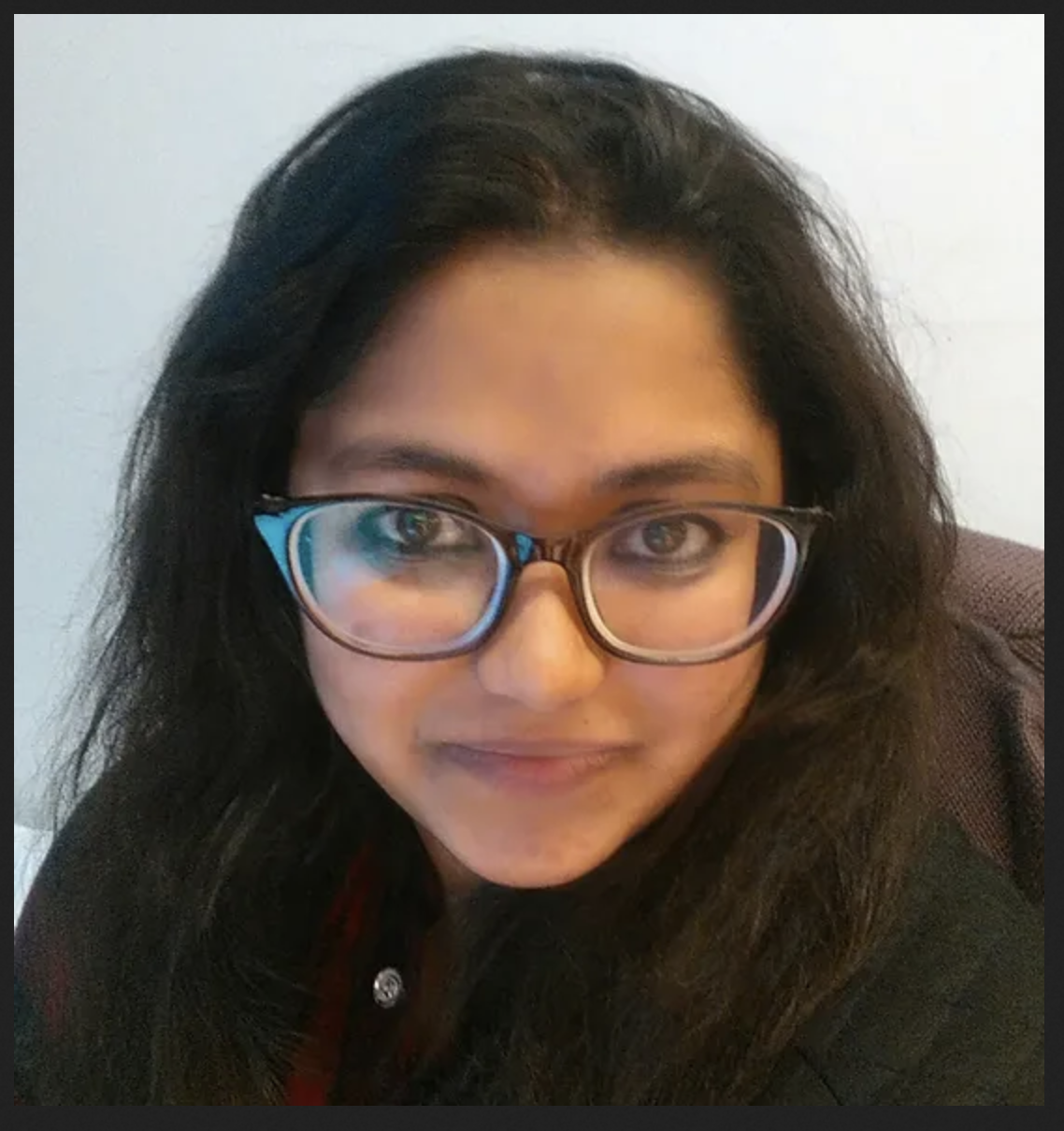Invited Talk - 1
Presenter:
Md Selim Habib
Assistant Professor, Electrical Engineering, Florida Institute of Technology, USA

Title:
Recent Advances in Next-generation Optical Fibers: Applications and Beyond
Abstract:
Over the last 25 years, the field of fiber optics has experienced remarkable progress, contributing to the widespread expansion of the Internet and bringing about transformative changes in various domains such as quantum communication and sensing, industrial manufacturing, directed energy, non-invasive laser surgery, early cancer detection, optical microscopy, and biomedical sensing. Undoubtedly, one of the most significant innovations in this field is the development of hollow-core anti-resonant fiber (HC-ARF). HC-ARF offers several promising and unrivaled features such as exceptionally well-confined photons inside the core offering an ideal platform for studying prolonged, well-controlled and diffraction free light-matter interaction in Raman active and inactive gases; low-loss, multi-octave wide transmission, adjustable pressure dispersion; and can tolerate GW of power, not possible to obtain in any waveguides or fibers. This talk will cover the most recent advanced optical fibers for applications in high-energy laser delivery system, ultrafast non-linear dynamics, and beyond.
Brief Biography:
Md Selim Habib received the Ph.D. degree in Electrical and Photonics engineering from the Technical University of Denmark (DTU) in 2017. Following the completion of his doctoral studies, he joined the Fibers Sensors and Supercontinuum Group at the Department of Electrical and Photonics Engineering, DTU, as a Postdoctoral Researcher. After concluding his Postdoctoral Fellowship at DTU, he served as a Postdoctoral Research Associate at CREOL, The College of Optics and Photonics, University of Central Florida, USA, from 2017 to 2019. From 2019 to 2023, Dr. Habib held the position of Assistant Professor of Electrical and Computer Engineering at Florida Polytechnic University, USA. Currently, he is an Assistant Professor of Electrical Engineering at Florida Institute of Technology. His research mainly focuses on computational electromagnetics, next-generation optical fiber design, fabrication, and characterization, and ultrafast nonlinear optics. He has published more than 100 articles in refereed journals and conference proceedings with over 2800 citations and an h-index of 32.
Dr. Habib is a Senior Member of Optica, USA and IEEE, USA. Dr. Habib is also an Associate Editor of IEEE Journal of Lightwave Technology, Feature Editor of Applied Optics (Optica), and Guest Editor of IEEE Journal of Selected Topics in Quantum Electronics. Dr. Habib has actively participated in various technical program committees, including the IEEE Photonics Conference and IEEE RAPID, USA.
Invited Talk - 2
Presenter:
Imtiaz Ahmed
Assistant Professor, Department of Electrical Engineering and Computer Science, CEA, Howard University, USA

Title:
Data Driven Design for Next Generation of Communication Systems
Abstract:
Recent advancements in artificial intelligence (AI) have inspired wireless communication engineers to integrate machine learning (ML) and deep learning (DL) techniques across various layers of communication protocol stacks. Among these, the physical (PHY) layer of wireless communication systems has emerged as a key area of interest, driven by the potential of AI to enhance end-to-end system performance—such as increasing data throughput, improving energy efficiency, reducing error rates, and mitigating the real-time computational challenges associated with traditional design approaches.
Conventional PHY layer designs often rely on block-based architectures, where each functional block (e.g., channel estimation, modulation, decoding) is optimized independently. While effective, this approach may not guarantee optimal end-to-end system performance, particularly when considering metrics such as error rate, throughput, and energy efficiency under diverse communication scenarios. Moreover, state-of-the-art signal processing algorithms, although robust, frequently impose significant computational overhead, presenting challenges for real-time applications. These limitations have motivated a paradigm shift toward AI-driven PHY layer designs that aim to break through performance bottlenecks while maintaining computational efficiency.
This talk will delve into three key areas where AI is revolutionizing PHY layer design and wireless networks:
- AI-Driven PHY Layer Optimization: Applications of AI in tasks such as channel estimation and joint transmitter-receiver design.
- Resource Optimization with Low Complexity: Leveraging AI to optimize wireless resources while adhering to strict computational constraints.
- Digital Twin-Enabled Networks: Designing and developing AI-powered digital twin frameworks for advanced network control and management.
Through these discussions, we will provide insights into the transformative potential of AI in enabling an intelligent and seamlessly connected world, paving the way for the sixth generation (6G) of cellular communication systems.
Brief Biography:
Dr. Imtiaz Ahmed is an Assistant Professor in the Department of Electrical Engineering and Computer Science (EECS) at Howard University, Washington, DC, USA. Dr. Ahmed works in the areas of wireless communications, signal processing, and computer networks. He finished his undergrad and Masters in Electrical and Electronic Engineering (EEE) from Bangladesh University of Engineering and Technology (BUET). He completed his Ph.D. in Electrical and Computer Engineering (ECE) from the University of British Columbia (UBC), Vancouver, BC, Canada in 2014. He then worked as a postdoctoral fellow at McGill University during 2014-15. Dr. Ahmed worked as a wireless systems engineer in Intel Corporation, San Diego, California for more than 3 years.
Currently, Dr. Ahmed is working on diversified topics in the areas of 5G and beyond 5G cellular communication systems. In particular, his research interests include artificial intelligence in physical layer design, intelligent reflecting surface (IRS) assisted communication network, cell-free massive MIMO, communications with THz bands, aerial terrestrial integrated network, digital twin for communication network, etc.
Invited Talk - 3
Presenter:
Dr. Bashir Morshed
Associate Professor, Computer Science, Texas Tech University, USA

Title:
Inkjet-Printed Dry Electrodes for Cardiac Monitoring Wearable with Real-time AI at Edge-Computing Smartphone App
Abstract:
Mobile Health (mHealth) technology in the last few decades has enabled an unprecedented capability in individual health monitoring and interventions. Cardiac diseases are the leading cause of mortality, globally affecting more than 20 million deaths per year. Electrocardiogram (ECG or EKG) is the gold standard for cardiac monitoring. ECG data can be used to detect Atrial fibrillation (AFIB) arrhythmia, a supra-ventricular tachyarrhythmia with uncoordinated atrial activation, which leads to ineffective atrial contraction. As AFIB is generally considered a progressive disease, not only early detection of this condition is important, but also continuous monitoring can be beneficial. For mHealth implementation of cardiac monitors, collecting ECG signal is a challenge as it requires additional electrodes and wearables for passive monitoring. Current ECG electrodes are gel based with very limited lifetime. We have developed thin-film dry ECG electrodes with an inkjet-based material deposition printer that are flexible, comfortable, and seamless to wear. We have fabricated these inkjet-printed (IJP) ECG electrodes using silver (Ag) nanoparticle (NP) ink as the conductive layer and a custom polymer ink of Poly 4-vinylphenol (PVP) as the insulating layer on flexible polyamide substrates (total thickness of ~30 µm). The flexible thin-film IJP dry ECG electrodes, that can sustain >100,000 bending cycles at 10 mm radius, have been tested and shown good coherence to commercial gel electrodes, while being less noisy than metal dry electrodes. Furthermore, we have also developed a custom wearable device for ECG data collection that contains a custom printed circuit board (PCB) connected to a commercial Bluetooth system-on-a-chip (SoC) to process ECG signals. The device can also capture real-time respiratory data using an inertial measurement unit (IMU). Finally, we have developed a custom smartphone app to detect cardiac episodes from a single-lead ECG data by analyzing each beat at a time, a unique approach for real-time AI implementation. The detection performances are compared among various ML/DL AI algorithms such as Naïve Bayes, Random Forrest, Decision Tree, Multilayer Perceptron, CNN, BiLSTM, transformer model, etc. This system can perform real-time classification algorithms at the edge computing device for AFIB episode detection and transmission of the relevant segment of the data to the cardiologist via a data server. Additionally, we are exploring a data reliability approach that can be beneficial in automated disease detection by identifying false predictions from unreliable data. The dry ECG electrodes, the wearable device, and AI algorithms are expected to improve mHealth continuous monitoring capability of cardiac patients for progressive diseases like AFIB, as well as detecting early signs of cardiac problems.
Brief Biography:
Dr. Bashir Morshed is an Associate Professor in the department of Computer Science at Texas Tech University since 2020. He was an Assistant/Associate Professor in the department of Electrical and Computer Engineering at the University of Memphis from 2011 to 2020. He has received B.Sc. in Electrical and Electronic Engineering from Bangladesh University of Engineering and Technology in 2001. He then completed M.Sc. degree in Electrical and Computer Engineering from the University of Windsor, Windsor, Canada, in 2004 and earned Ph.D. degree in Electrical and Computer Engineering from Carleton University, Ottawa, Canada in 2010. He was a post-doctoral fellow at the Medical Devices Innovation Institute, University of Ottawa, Ottawa, Canada. He is a recipient of the prestigious Canadian Commonwealth Fellowship, Indira Gandhi Memorial Fellowship, Ontario Graduate Scholarship, and Ontario Graduate Scholarship in Science and Technology. He is one of the 2018 mHealth Training Institute (mHTI) scholar. He has 3 issued patents (USPTO), and has published 1 sole-authored book, 1 book chapter, 45+ journal articles, and 150+ peer-reviewed conference papers and posters, two of which have received best paper awards. He is a Senior Member of IEEE (since 2019) and was awarded Faudree Professorship at University of Memphis. He has received multiple research grants from the National Science Foundation (NSF) as the Principal Investigator. His research interest is holistic biomedical device development for real-life health monitoring utilizing novel technologies such as inkjet-printed body-worn flexible electronics and real-time AI implemented at edge computing for mobile health (mHealth) and smart health (sHealth) applications.
Invited Talk - 4
Presenter:
Sharifa Sultana
Assistant Professor, Computer Science, University of Illinois Urbana-Champaign, USA

Title:
Automatizing Human-AI Interaction: Challenges and Opportunities
Abstract:
While AI offers immense benefits, seamlessly integrating it with human experiences requires careful consideration. My research explores the concept of automating human-AI interaction, focusing on the challenges and opportunities that arise in this emerging field. My work addresses several key challenges, including the complexity of natural language understanding, the development of adaptable and context-aware AI systems, and the preservation of user privacy and security. I also look into the ethical implications of automating human-AI interactions, such as potential biases in AI-aided record-keeping and persuasive decision-making. The speaker also highlighted the potential for AI systems to improve productivity, efficiency, and personalized user experiences, freeing up human resources for more complex and creative endeavors. Finally, the talk will elaborate on the need for multidisciplinary collaboration between computer scientists, human-computer interaction experts, ethicists, and other relevant stakeholders to ensure that AI systems are developed and deployed responsibly, ethically, and with a focus on users.
Brief Biography:
Sharifa is an assistant professor in computer science at UIUC. Her areas of expertise lie at the intersection of Human-Computer Interaction (HCI), Human-AI Interaction (HAI), and Information and Communication Technologies for Development (ICTD), a growing area of study that focuses on the interplay between global development and technologies.
Sharifa’s research focuses on studying and building computing technologies for recognizing the identities and values of and justice with marginalized communities. She deploys a variety of qualitative, quantitative, and design methodologies to probe and address social justice agendas in low-resource, marginalized communities. She has conducted several long-term ethnographic field studies in Bangladesh to reveal the challenges that rural populations and minorities face, and built computing technologies to improve the quality of their lives. She employs critical social science theories in building computing systems that relate to understanding and overcoming the challenges of marginalization, oppression, and injustice. She has published the results of her work at top-tier conferences such as ACM CHI, ACM CSCW, and ACM ICTD. Her work has received a best paper award, two best paper honorable mentions, and a diversity and inclusion recognition. She is a recipient of the DPI grant, the GIANT Innovation grant, and the Facebook Fellowship, and she won multiple grants on collaborative projects funded by Meta and the Bangladesh ICT Ministry.